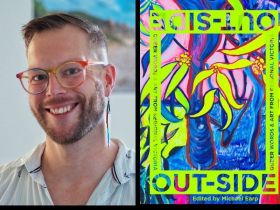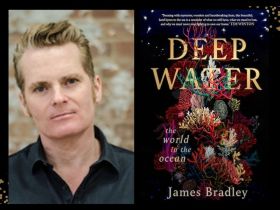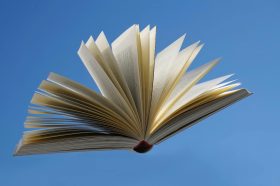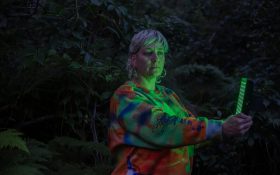Author Joan London; photo by Abby London.
Day three began with ‘Family Secrets’. As a family history enthusiast, I was keen to hear Kristina Olsson and Miranda Richmond Mouillot on the topic, in conversation with Kathryn Shine. Olsson’s grandparents were Holocaust survivors who eventually wound up in Australia. They lived apart and no one in the family ever mentioned the Holocaust, yet Kristina Olssen somehow grew up knowing about their background.
She firmly believes that as a family historian, she was honour-bound to serve the truth, whilst accepting that there are often truths that we cannot access. To write about her grandparents’ courtship, she felt obliged to research café culture in Brisbane in the 1930s. Her mother had been seduced by a much older man who frequented the café where she was a waitress. When Olsson came to write those scenes, she made it quite clear in her narrative that the reproduction is fictional.
Miranda Richmond Mouillot feels it is essential for the researcher to know when she is telling the truth as she understands it and when she is embroidering the facts. She feels that researching family history is essential if we are to rediscover our own humanity.
Next I accompanied my colleague Ilsa Sharp to hear Elizabeth Gilbert with Michael Cathcart. Ilsa will review this elsewhere, so suffice it to say hear that ‘The Signature of All Things’ was a fascinating journey into history and the craft of writing.
‘Delivered with a Smile’ was the title of a talk by Christine Kenneally and John Lanchester. Kenneally’s interest lies in linguistics. How does human language work in the brain? How do people pass on and process information? One of her interests is DNA and how it connects us to the past, so once again, we are in family history territory!
John Lanchester wanted to write a Big Thick London Novel, and he quickly realised that one of the mainstays of London society is finance – so his book turned into a lexicon of life in London.
Gradually the discussion came to focus more and more on statistics rather than linguistics, so I went to join a friend for a coffee prior to the next panel, ‘Women in Power’, with Geraldine Doogue and Mary Delahunty, chaired by Kathryn Shine. This one was fascinating. Mary Delahunty spent a full year as PA to Julia Gillard, where she learnt what might make a female politician tick. First, says Delahunty, she needs a deep sense of self, which includes self-awareness.
Doogue put forward the suggestion that self-knowledge lies in finding your own voice and having convictions about the things that are important to you. She also ran through a classification table of Women in Power. First there is the Maggie Thatcher approach; one that leads to her being seen as a Mother Figure for an entire country. Then there is the Wise Woman – that was Julia Gillard’s path but she did not survive long enough in office to bring that idea to maturity. Instead she was seen by many as a Witch, the flip-side of the Wise Woman. The last one is the Warrior Woman, who must constantly survive the subliminal text ‘Can you lead?’ Women leaders must face a barrage of misogyny and disappointment, often accompanied by disrespectful imagery which often leads to pornography. Women generally, Delahunty suggests, are only honoured in supporting roles.
‘Drawing from History’ was chaired by Natasha Lester with participating authors Jo Abercrombie, Robyn Cadwallader, Kate Forsyth and Juliet Marillier. These four have individually mined various historical periods for people, places and events that inspire their stories. History is not the end of the road, though. For instance, Juliet Marillier found she needed to research Post-Traumatic Stress Disorder for her latest book, Dreamer’s Pool. All the authors gave a short reading and then discussion became freer, giving listeners lots of tips on the craft of writing in general.
Next, Joan London spoke with William Yeoman about her new novel, The Golden Age, set in Perth in the 1950s. Here again, much research was needed: childhood memories, vivid though they can be, are not enough on their own!
And finally, the closing talk by guest-of-honour Bryan Stevenson. A human rights activist in the context of defence law in the USA, Stevenson has spent 30 years in the job. His revelations of facts and figures were earth-shattering enough, but it was his personal stories that brought the audience to its feet, cheering and clapping, after an hour had flown by under his silver tongue. As an aside, he mentioned that books, words and ideas can change the world, and to create change, we also need to get close to the things that matter. Proximity is key, and good literature makes one appreciate proximity.
All in all, a wonderfully varied Writers Festival that gave us an opportunity to hear some amazing speakers and readers, and to touch on genres that we might not normally read. Roll on 2016!
Perth Writers’ Festival
19-22 February as part of Perth International Arts Festival
www.perthfestival.com.au





